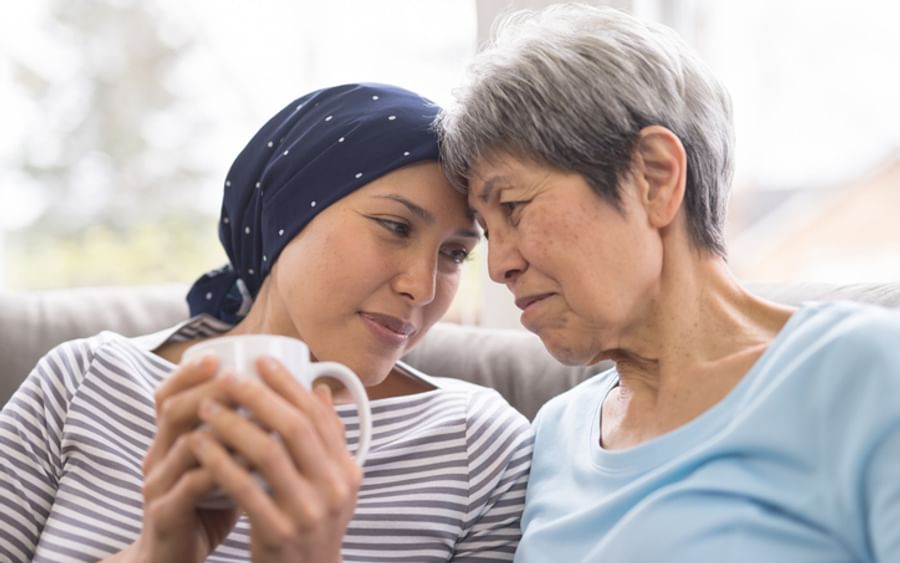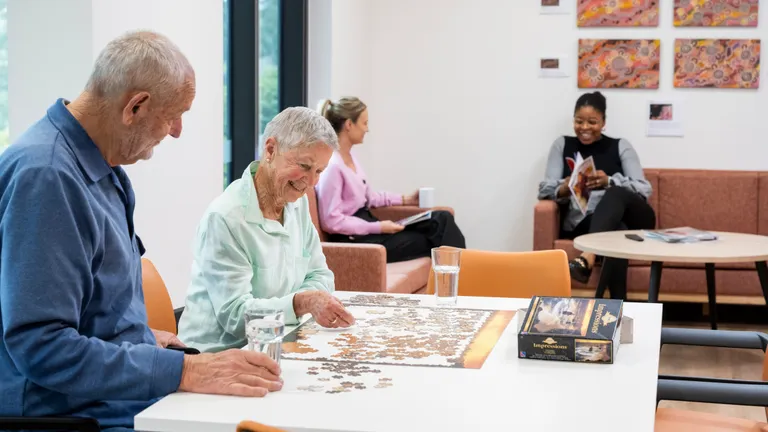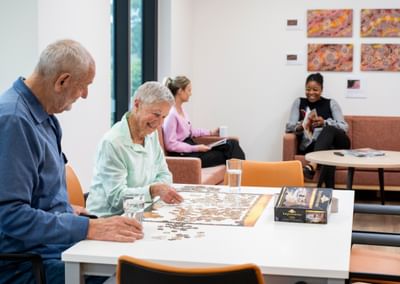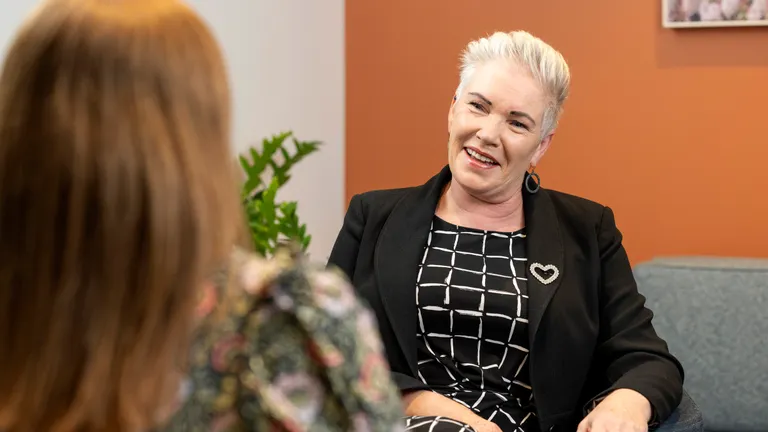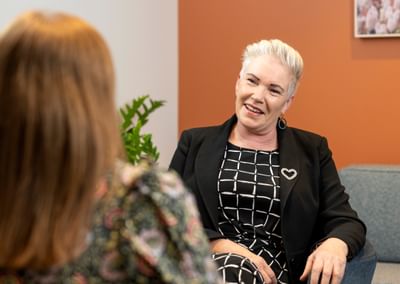This information has been prepared to help you understand more about grief when someone close to you has died from cancer. Coping with grief doesn’t mean getting over the person’s death. It’s about finding ways to live with the loss.
This information was developed with help from a range of health professionals who provide bereavement support and people who have had someone close to them die from cancer. If you or your family have any questions or concerns, call Cancer Council 13 11 20. We can send you more information and connect you with support services in your area.
What is grief?
Grief is a natural response to any loss. The process of grieving is one of adjusting to the loss. There is no set time frame or pattern for learning to live without someone. Grief may never go away completely. With support and understanding, you will find a way to cope.
Everyone grieves differently
Everyone responds to the death of someone close to them in their own way and in their own time. This information focuses on grief after a death from cancer, but much of the information applies to any type of loss, such as the loss of a relationship, a job, a pet, your good health, your way of life or treasured possessions.
Grief can be a confusing and overwhelming experience. It can involve a range of feelings and they can affect you in different ways. You may find it helpful to learn more about common grief reactions and ways of coping. The way you grieve can be affected by a number of things, including:
- how old you are and the age of the person who has died
- your gender
- your personality
- the relationship you had with the person who died
- the support you have from others
- how much your life will change as a result of the death
- your cultural background, including any rituals or customs associated with death
- past experiences of loss and death
- how the person died – whether their death was expected, unexpected or traumatic
- your spiritual view of life and death
- other stresses you have in your life (e.g. financial, housing)
- your past and present mental health and wellbeing.
How you feel and react to grief may be influenced by the person’s cancer experience and the way the disease progressed. You may find that you focus on memories of the physical changes and deterioration experienced by the person who died. Or you may wonder if the person could have received different treatment or care.
How family and friends might grieve
It is common for family members and friends grieving for the same person to deal with their grief in different ways and for different lengths of time. It is important to respect how others are grieving.
People may behave differently at different times – and their behaviour may be unpredictable. Some people express their grief through crying and talking, creative activities, outbursts of anger or keeping busy. Other people prefer to be quiet, spend time alone or join a support group. If someone’s way of grieving is uncomfortable for you, try to avoid judging them and accept that everyone is different. Let them grieve in a way that feels right for them.
This can be an opportunity to support and comfort each other and understand other ways of grieving.
Bereavement, grief and mourning
The terms bereavement and mourning are closely related to grief, but they have slightly different meanings:
- Bereavement – usually refers to the period of sadness after a death.
- Grief – is the process of responding to the loss and it can affect all parts of your life.
- Mourning – is how you show sorrow for someone’s death, which may be influenced by cultural customs and rituals.
Types of grief
There are a number of different types of grief that can occur in the lead up to, and period that follows, a death.
Anticipatory grief
Grief is not just something that happens after someone dies. When someone is ill for some time and the death is expected, their family and friends may begin to grieve their death before it happens. This is known as anticipatory or pre-loss grief. It does not make grief after the death any easier or shorter, and the death can still feel like a great shock.
Knowing that someone will die soon may give you the chance to finish a project together or have important conversations. Anticipatory grief may also provide the opportunity to imagine the future without your family member or friend. This doesn’t mean you are a bad or uncaring person. If the person died at peace, having said and done what they wanted to, this may give you a sense of comfort.
Traumatic grief
If the death was very sudden, or in traumatic circumstances, you may feel that things were left unfinished or unsaid. You may not have been able to be with the person when they died, or things may not have gone as you wished. You may also be managing symptoms of shock and disbelief. Some people are traumatised due to experiences during the illness and death of a significant person.
Trauma leads to challenging physical and emotional symptoms and can complicate grief for affected people.
Complicated grief
Grief may be complicated if you have conflicted feelings about the death. This may be because you’ve had difficulties, in the past or in the present, with the person who died. Relationships can often be complex and challenging, while still being caring. If other people didn’t know about or understand your relationship with the person who died, you may feel very alone in your grief.
Preparatory grief
The person who is dying may experience preparatory grief as they process the fact that their life will end soon.
Preparatory grief means they may grieve the loss of their health, as well as the things they may miss out on, such as an upcoming family wedding or grandchild.
They may have a range of feelings about what is happening to them, including anger. Some may also see it as an opportunity to organise paperwork or prepare keepsakes such as a memory box, letters or a recording ahead of their death.
At times the sadness and pain I feel is all consuming and hard to bear, while at other times these feelings are just in the background of my day-to-day activities.”
The experience of grief
Grief is not just sadness. It can affect your emotions, thoughts, physical wellbeing, behaviour, beliefs and relationships. All these effects can make grief feel overwhelming at times. The tips in this section may be useful as you try to come to terms with different aspects of your loss.
Emotions
You may feel a range of strong emotions, such as sadness, anger, relief, guilt or anxiety. Sometimes people are overwhelmed by the strength of their feelings or find that their mood changes quickly and often. These are common ways of coping with loss. How your body responds to grief can also affect your emotions.
Try to use the coping strategies that have worked for you in the past. Remembering how you have coped with other difficult situations may help you feel more able to cope now with your emotions. Or you may find that your usual ways of coping are not helpful with your current loss, and you need to find other coping strategies. Explaining how you are feeling to family and friends can help them understand what you’re going through.
People who tend to adjust well to difficult or challenging situations (resilience) often find that they show this quality after a loss. This doesn’t mean they are not grieving, but that they already have coping strategies.
Shock and numbness
When someone dies, you may feel nothing at first. This may be because you can’t believe it’s true, you’re still in shock or you’re protecting yourself from the enormity of what’s just happened. It may feel like the person who died will suddenly walk through the door again.
This numbness can be helpful during the first days and weeks after a loss, when you need to focus on practical arrangements, such as planning and attending the funeral. Don’t feel you have to push yourself past this emotional numbness. For most people, it will start to change in a few days or weeks, although it may return from time to time. The reality of your loss may be more deeply felt as time passes.
"I knew he was going to die, but nothing prepared me for the depth of my sadness when he did. Even though I was surrounded by family, I felt so very alone.” Vanessa
Sadness
You may feel like the sadness will never go away. You may long to see the person so much you don’t know what to do with yourself. You may cry, or you may feel unable to cry, even though you are terribly sad. If you release emotions with crying, you may find it hard to stop crying, with tears sometimes coming when you least expect them. This could mean you avoid going out because you can’t predict or control the crying. While this is understandable, it’s a good idea to try and gradually do some outings where possible.
Depression and despair
When the reality of the loss sinks in, you may find your sadness overwhelming or feel like your life has lost meaning. A loss of enjoyment in life and a lack of direction are common.
If you have continued feelings of sadness, have trouble getting up in the morning or have lost motivation to do things that previously gave you pleasure, you may be experiencing depression. This is quite common.
Talk to your GP, because counselling or medicines – even for a short time – may help. You may be eligible for sessions with a psychologist. Cancer Council SA provides a free counselling program. Call Cancer Council 13 11 20 for more information. For information about coping with depression, visit Beyond Blue or call them on 1300 22 4636. For 24-hour crisis support, visit Lifeline or call them on 13 11 14.
Anger
Many people feel anger when they are grieving. And you may find it comes and goes. You may feel angry with your god, with the person who has died, and with yourself. You may also feel angry with the cancer, the reality of death, with those involved in caring for the person who died, with people living their lives as if nothing has happened – even the person behind you in the supermarket queue – or for no obvious reason. If the person died at a younger age, you may feel anger when you see other people who are well and happy because the person who died did not get the opportunity to live longer.
Finding ways to express your anger can help. This may include talking with a trusted friend or counsellor, doing physical activities such as gardening or exercise, listening to or playing music, getting creative, or joining a support group.
Relief
You may be surprised to feel relief that the person has died, and then guilt for feeling this way. The relief may be because they were unwell for a long time, they needed a lot of care or they had symptoms that were challenging, such as anger, irritability or changes to personality. Seeing someone in pain is hard, so it’s natural to feel relieved that they are no longer in pain. The relief may be that the inevitable has happened and that you’re no longer living in anticipation of their death.
If your relationship with the person was challenging or complicated, you may also feel relieved and a mix of other feelings such as sadness, anger or guilt at their loss. When a person dies, we are often expected to focus on their good points and not criticise them – but dealing with cancer is bound to show all sides of people. Try to remember that the person who died was human, with good and bad traits.
Guilt and regret
You may feel guilt or regret for various reasons, including for the:
- way you behaved to the person in the past
- things you did or didn’t do
- decisions you made about their care
- things you left unsaid.
Try to remember that no-one is perfect, especially when dealing with the stresses involved in caring for someone with cancer. Remind yourself that you tried your best, often in difficult circumstances.
Sometimes people feel guilty when they find themselves joking and laughing, feeling happy at times, or getting on with life. But it is normal to experience a range of emotions as you learn to live with the loss – it doesn’t mean that you didn’t care about the person or that your grief is not genuine. Light-hearted or joyful moments can help to counter the lack of control that grief can bring and help you release some of the physical tension that often comes with grief.
Fear and anxiety
People often become very fearful when they have a major loss in their life. You may be afraid of what the future holds and how you will cope, worry about other people you love, or fear for your own health. You may be anxious about how you’ll cope with tasks you’ve not done before, such as finances, cooking or parenting. You may find yourself worrying about things that were no trouble to you before, such as going for a walk, doing the shopping or going back to work.
If you find that your fear or worry is affecting your ability to do your usual roles and routines, or is causing you enduring and severe distress, it might be worth seeking support.
Tips for coping with how you feel
- Accept that your feelings are to be expected given the loss. You might sense pressure from yourself or others to behave in a certain way, but remember that everyone has their own style of coping.
- Be patient with grief. You may feel that after a certain time you should be “moving on”, but your adjustment to the loss is likely to be gradual, and may take longer than you or others expect.
- If you feel anger, find safe ways to show it – exercise, scream or shout, write, paint or draw.
- Try to make movement a part of your daily routine. Research has shown that regular physical activity can help with feelings of anger, stress, anxiety and depression.
- Reflect on the experience of your caring role – you may feel you are stronger than you realised and be proud of how you supported someone as they were dying. Even the small things you did showed how much you cared.
- Forgive yourself for the things you didn’t say or do.
- Be kind to yourself for any wrongs you feel you did to the person who died. People often feel that they should not have become frustrated or “snapped” that one time when they were tired. Understand that tiredness and irritability are common when caring for someone.
- Take your mind off your grief for a little while – read a book, write in a journal, start a new project, play a game online, or watch a movie with a friend or on your own.
- Try complementary therapies to help you manage your feelings. Examples include meditation, music or art therapy.
Download our ‘Understanding Complementary Therapies‘ booklet and listen to our ‘Finding Calm during Cancer‘ podcast.
Thoughts
Grief often makes thinking clearly, focusing and concentrating difficult. Even simple tasks can seem hard. You may feel very indecisive, or you may make impulsive decisions. Some people may even wonder if they are losing their mind.
Be kind to yourself. How you are feeling is understandable given that you have experienced the death of someone important to you.
If you are feeling confused and forgetful, it may be helpful to write things down.
Tips for managing jumbled thoughts
- Where possible, try not to make any major changes or decisions until you can think more clearly. People may hurry you to sort out clothes and personal items or decide where you will live long term. Don’t feel rushed – you are already adjusting to a huge change.
- Use a diary or online calendar or app to keep track of appointments or set reminders on your phone.
- Use apps like Gather My Crew to coordinate offers of help from family or friends.
- Ask others for assistance. They can help you sort out paperwork or, if you have school-age children, keep up with school activities.
- If you are working, talk to your employer about how much time off you need, changing your hours or tasks temporarily, or ensuring that your job will be there for you.
- Write about how you feel. Keeping a journal or writing down memories and thoughts can help you process the experience.
Physical symptoms
Grief is experienced in your body too. The shock of the loss, even if you were expecting it, releases adrenaline and other chemicals. This can make you feel anxious or make it hard to switch off worrying thoughts. Other physical responses to grief include exhaustion, fatigue, headaches, nausea, unexplained aches and pains, changes to appetite, and a tight feeling in the chest and stomach. Grief can also weaken your immune system, which makes you more likely to catch colds or other infections.
The physical effects of grief on your body can affect your ability to manage your emotions and think clearly. Talk to your doctor about any physical issues that are worrying you or making it harder to cope.
Difficulty sleeping – It’s common for grief to change sleep patterns, from sleeping a lot to sleeping a little. You may find it hard to get up in the morning, fall asleep or stay asleep, or you may have long periods of being awake during the night. If you’ve been caring for someone, you may have had to be alert during the night in case they needed help. It can take time to adjust to sleeping more soundly again. You may have dreams or nightmares in which you see the person who has died.
Feeling exhausted – Don’t be surprised if you have no energy and feel constantly tired. Adjusting to any major change is exhausting, and too little or too much sleep can make you feel even more tired.
Changed appetite – It is common to have either little appetite or an increased appetite after a loss. Some people also experience an upset stomach, which may last for some time or come and go. Changes to your appetite or weight can make you feel distressed. Please know that you can talk to your GP or counsellor about your concerns.
Tips for coping with physical symptoms
- Try and get some exercise every day. A walk can improve your mood, clear your head, give you more energy and make it easier to sleep. You can try walking, swimming, a team sport, yoga, dancing or a new activity. Even doing housework such as vacuuming or mowing the lawn can help if you’re feeling tense.
- Go to bed and get up at the same time every day.
- If you’re unable to fall asleep, get up and do something relaxing (e.g. read a book, or listen to music or a podcast) until you feel sleepy. Practise slow, deep breathing or progressive muscle relaxation exercises while in bed – this will slow down the mind and allow the body to relax.
- Ask your doctor before using sleeping tablets or natural sleep remedies.
- Get in touch with a support service if you need to talk to someone. Talk to your doctor about seeing a counsellor, social worker or psychologist.
- Limit caffeine, alcohol and electronic devices as they can affect sleep.
- Try to eat a healthy, balanced diet. If you have lost your appetite and are barely eating, try to snack on nourishing, easily digested foods.
- Avoid eating unhealthy foods or eating large amounts of food for comfort. A poor diet can affect your mood.
- Explore other ways to help yourself feel better, such as getting fresh air and exercise in a park, listening to music, or having a bath or massage.
- Try meditation or relaxation to help with the anxiety. There are many recordings, videos and smartphone apps to guide you through different exercises. Listen to our ‘Finding Calm During Cancer‘ podcast.
Behaviours
You may act differently when you are grieving. You may try to keep yourself busy, sleep a lot or find it hard to complete even simple tasks. Many people avoid reminders of the person who died because of the intense emotions. These different behaviours are normal but can make
it difficult to settle into a routine.
Some people smoke, drink alcohol or use other non-prescribed drugs. While these behaviours may give short-term relief, they often only delay the experience of grief and can lead to more serious problems. If you or others are concerned about your use of alcohol or other drugs, ask your GP for help and support.
Tips for establishing helpful behaviours
- Try to live day-to-day rather than looking too far ahead or backwards.
- Balance rest and activity. Set small goals and congratulate yourself when you achieve them.
- Have an alternative plan ready in case you’re not up to a planned activity.
- Go easy on yourself. You may need to relax your usual routines or standards while you are grieving.
- Keep to a daily routine that includes the time you get up, get dressed, eat meals and go to bed. This can help you maintain healthy habits and self-esteem.
- Have something to look forward to (e.g. buying a bunch of flowers; having a massage; listening to music; getting a haircut; enjoying a live performance or visiting a coffee shop).
- Schedule days now and again without any plans or goals to give yourself a chance to recharge.
Spiritual beliefs and faith
Your spiritual beliefs may be challenged as you question the meaning of the loss and what happens to us after we die. Some people find comfort and strength in their spiritual beliefs and in connecting with other members of their faith. Other people feel abandoned or betrayed
at a time of great need. If your faith has been important to you, this can be one of the most unsettling aspects of grief.
You may find that your search for answers leads to spiritual growth. Whatever your beliefs, it can be helpful to explore questions about life and death with someone you trust, such as a spiritual care practitioner, family member, friend or counsellor.
Tips for exploring the spiritual impact
- Find ways to connect with what spirituality means to you (e.g. praying; visiting a place of worship; going for a walk in nature; meditating; listening to music). This connection may give you a different perspective on life and a larger way of seeing your situation.
- Talk about your feelings with a spiritual care practitioner (pastoral carer, chaplain or religious leader). There will usually be one on the palliative care team. You can also ask the hospital social worker if there is someone you can talk to. Accept that having doubts or concerns may be part of a process leading to a stronger sense of your own spirituality.
- If it feels right to you, follow the mourning customs of your religion or culture. Some people like the structure these customs provide for their grief.
- Create your own rituals (e.g. visiting a place where you feel close to the person who died; lighting a candle; creating a playlist).
Relationships
Grief affects how you interact with the world, your identity, and the roles you have within your family or social circle. You may find that your friendships and family relationships change.
A sense of presence – It is common to feel a sense of closeness to the person who died. People often report that they see, sense or dream about the person, especially in the first few weeks. Most people find this comforting; but some may find it frightening and unexpected.
Loneliness – People often feel intensely lonely. You may have lost someone you shared activities with, or if your caring role was a major part of your life, you may feel lost without it. It can take time to work out a new routine or identity. After some time has passed, you may still feel your loss very strongly, but find that others seem to have moved on. This can be hurtful and make you feel alone, and you may withdraw from those around you. By trying new activities and groups, you may form new and supportive friendships.
Abandonment – You may feel abandoned and rejected by the person who died. Or you may feel neglected by family members and friends you thought would be there for you. You may be surprised by who offers the support you need – often it’s someone who has experienced a major loss themselves.
Conflict – It’s common for families to experience conflict at the time of death and afterwards. Because everyone grieves in their own way and in their own time, you may have disagreements with family members and friends after someone dies. There may also be conflicts over the person’s will and who gets their treasured possessions. It is important to get support through these difficulties.
Tips for staying connected with others
- Know that you are not alone. Loss is part of being human. Find someone you can talk to who will listen and be understanding, or ask your GP or palliative care service about bereavement counselling.
- Find ways to stay connected to people who have died.
- Read other people’s accounts of grief. Find stories online, through bereavement support groups or resources at your local library.
- Join a support or grief group – either in person or online. Call Cancer Council 13 11 20 to find a support group.
- Share your thoughts about the dying process with the people who were there with you.
- Ask others for assistance – it will make them feel valued and useful.
- Re-enter your social circle slowly. At first, mix with people you feel comfortable with and who understand you well. Even if you are just sitting and listening, you are connecting to others.
- Consider who can meet your different needs. Some people might be good at providing practical help, while others are better at providing emotional support.
- When you feel ready, join a social group or take up a new activity. Recognise that the first time you return to an activity, such as going to the shops, club, school or work, is likely to be the hardest. It tends to get easier with time, but asking someone to come along with you can make the initial steps feel less daunting.
- Be gentle and forgiving with others and yourself. Grieving family members and friends may seem angry or irrational. Try not to take it personally. Keep in mind that you are vulnerable too and have the right to protect yourself. Let someone else support them for a time.
How long will it last?
Living with grief raises many questions. This section discusses how long grief might last and what to do when grief feels overwhelming.
Answers to some common questions about grief are below.
Why do I feel so alone after the funeral?
The time after the funeral can be challenging. Between the death and the funeral, you may have been surrounded by family and friends, and busy making arrangements. After the funeral, you may feel the full intensity of your grief. You may find that other people don’t check in with you as often and their lives seem to have returned to normal, but your life is forever changed. It will take time to create a “new normal” for yourself.
How long will grief last?
You might think that you’ll be back to normal after just a few weeks or months, and others might expect this of you too. Try to be patient with yourself. Many people are hard on themselves, thinking things like “I should be over this by now”. Grief is very individual – there is no set time frame or stages. Allowing yourself to grieve is the best way to heal.
Friends and family might say, “Life goes on. It’s time to move on.” Such comments may feel like you are being told not to grieve anymore. People making these comments may feel uncomfortable about grief or may have particular ideas about how to grieve. There is no right way to grieve. At times, you may hide how you’re feeling so others don’t worry about you. Share how you’re feeling with people who are more likely to understand. Those who knew the person may be more empathetic.
"I think time does heal, but the pain is still there and you just learn to cope with it. Sometimes I still cry out ‘Why?’ Darren was so full of life and never complained about anything; I’m still amazed at how he coped with it all.” Troy
Why do some things make the grief worse?
A trigger can be anything that causes a strong reminder of your loss. Many people say the first year or two can be particularly difficult. With time, most people find they learn to adapt, although birthdays, anniversaries or other special dates might always cause a range of strong emotions. Reach out to supportive friends and family at these times.
You may continue to feel a deep sense of loss for the experiences that the person didn’t get to have and that you didn’t get to share. Some people find comfort in visiting the burial site or another significant location, or in gathering with others in remembrance of a family member or friend.
Other losses could trigger your grief again. This may happen when someone else you know dies or when a pet dies, when a relationship ends, or when you lose a job or special possessions. Events that would normally be joyful (e.g. birth of a baby or a wedding) may have a similar impact as you mourn the absence of someone who should have been there to celebrate. Sometimes you may forget that the person has died, and when you suddenly remember, you may be shocked all over again.
You might find there is a time of day when you miss the person most. Or it may be a song, a smell or a place that reminds you of them, and you may feel upset again.
If the person who has died had a digital presence, this is likely to remain for people to see and interact with. You might find encountering them online upsetting or it might be a way to stay connected to the person who has died and a way to “keep them alive”. If you have been nominated as a legacy contact, you can memorialise their Facebook page.
Why do I feel so up and down?
People sometimes refer to stages of grief, but grief isn’t something you begin one day, move through step-by-step, and come out from unchanged. Grief is dynamic and changeable. This can feel chaotic, but both the ups and downs are part of grief.
Most people find that they don’t get over the loss but they slowly learn to live with the loss. It is common for the way you cope with grief to change. You may switch between feelings of intense grief and activities that distract you from your grief. You may move between focusing on the loss (crying, missing the person, feeling pain) and moving forward (returning to activities, learning new skills, forming new relationships). You may do this again and again. The experience is often described as being on a roller-coaster or a series of waves.
Will it always be this hard?
When people find grief particularly difficult, they sometimes worry they will be unhappy for the rest of their life.
For most people, it isn’t like that. After a while, the grief usually becomes less overwhelming, and they start to enjoy things and feel enthusiastic about life again. Many people say that coping with grief is about finding ways to live with the change and adapting to life without the person who has died. It’s not that your feelings about the person lessen, so much as a new way of living grows around the loss.
What if I feel “stuck” or desperate?
You may have times when you feel like you just can’t go on any longer. The pain of grief is too hard or just doesn’t seem to be getting any better. Be kind to yourself – it is normal that some days are much harder than others. With time, you may start to notice a pattern of good days and bad days, with the good days gradually increasing.
Sometimes a person may feel “stuck” in their grief and feel very depressed or anxious. Or worse, they may begin to think about suicide, as though not going on is a real option. If this is the case for you or someone you care about, it is important to get help. Seek professional help if you:
- find it difficult to get through daily tasks
- begin to depend on alcohol or other drugs
- stop eating regularly
- are sleeping too much or having a lot of trouble sleeping
- are worried you might hurt someone because your feelings of anger or aggression do not settle
- are thinking about self-harm or ending your own life.
Getting support may help you feel less alone. Many organisations and health professionals can help. You can also talk to your GP or call Cancer Council 13 11 20.
If you are thinking about suicide, call Lifeline or the Suicide Call Back Service
1300 659 467 immediately. Both these services are available 24 hours a day.
How can I remember someone?
You may find that doing something special to remember the person gives you and others comfort. Here are some ideas that other people have found helpful.
Talk about the person who died – Sharing your memories with other people can help you cope, and you may learn something new about the person.
Create a tribute page – Share stories and photos on an online memorial page.
Make a memory box – A memory box is a place to keep things that remind you of the person. You could include photos; a favourite item of clothing, such as a cap or scarf; a bottle of perfume or aftershave; letters or cards; a special recipe; and a record of memories of the person.
Establish an award – You could set up a memorial prize or scholarship in the name of the person.
Get creative – Use some of their clothing to create a quilt, cushion cover or memory bear; or paint or draw a picture.
Enjoy what they liked – You may cook their favourite meal on their birthday or anniversary; buy their favourite flowers or drink on the anniversary of their death; or share a meal with family and friends on significant days.
Get involved in a cause or make a donation to a charity – Many people feel motivated to become involved in an organisation that was special to the person. Others want to raise awareness or fundraise for a charity that helps people with cancer.
Frame photos or create a photobook – Aside from your favourite photos, you could frame a cherished handwritten note or memento.
Plant a tree, plant or flowers – Create a special area to visit when you want to feel close to the person.
Be prepared – Plan ahead for occasions that might be difficult such as birthdays, the anniversary of the death, and holidays.
Create special rituals – Rituals can help you acknowledge a loss, particularly at challenging times such as anniversaries. You could light a candle, listen to special music, visit a certain place or cook their favourite meal.
Remember shared goals – Consider if you still want to do the things you were going to do together.
How to help someone who is grieving
It can be hard to know how to help someone who is grieving. You may become lost for words or feel hesitant about offering practical assistance. Simply making the offer can let the person know they are not alone. If you need to support grieving children, it may help to know they often react to death in a different way to adults.
What if I say the wrong thing?
It’s common to worry about saying or doing the wrong thing to someone who is grieving. It’s okay to be honest and say, “I want to help, but I’m not sure what to do” or “I don’t know what to say, but I want you to know I care. Please let me know when I get it wrong.” Most grieving people say that it’s worse when others say nothing at all.
It may not be as helpful to say, “I know how you feel.” Each person grieves in their own way. Your experiences may give you a better understanding of the person’s situation but remember that they may not react in the same way as you would or did. If you feel you’ve said the wrong thing, acknowledge that you made a mistake.
Give reassurance where you can, but don’t try to find something positive in the death. Avoid saying things like “It was for the best” or “Their suffering is now over”. To empathise without suggesting you know exactly how they feel, you could say, “You’re in my thoughts, how are you feeling today?” or you could share a story about the person who died.
How can I ease their pain?
If you know someone who is grieving, it is important to recognise that you cannot, and do not need to, fix their grief. Grieving is the way we adjust to loss and it is a natural process. Be patient and give them time to grieve. Don’t expect a bereaved person to feel or behave in a certain way by a certain time. Allow them to do things in their own time.
It is understandable that the way the person feels may change often and seem unpredictable. One day the person may feel hopeful, the next day sad and full of despair. This is a common part of grief.
While practical assistance can ease someone’s burden, especially in the days and weeks after the death, follow the person’s lead about how much help they want. Sometimes getting back into everyday routines, such as shopping, cooking and gardening, is how a person manages their grief. If someone does require practical support, offer to coordinate assistance from others.
Provide help in the way you think is right for the relationship you have with the person. Sometimes this might be with a caring smile or offering a hug, other times it might be taking the time to listen.
When to suggest professional help
It is normal for a person’s grief and sadness to go on for some time. Sometimes, however, a person experiencing grief can develop anxiety, depression or have thoughts of suicide. If they are consistently having difficulty doing everyday tasks (e.g. going to work, caring for children, eating and showering) or show any of the following behaviours:
- beginning to depend on alcohol or other drugs
- they stop eating regularly
- they are sleeping too much or having a lot of trouble sleeping
- you are worried they might hurt someone because their feelings of anger or aggression do not settle
- they are thinking about self-harm or ending their own life.
You could encourage them to talk with their GP, get a referral to a mental health professional or join a bereavement support group. Offering to drive them to doctors’ appointments or therapy can be a practical way to help.
If you are worried that the person may be thinking about suicide, it’s okay to ask them direct questions such as “Have you thought about suicide?” or “Are you thinking of hurting yourself?” These questions show that you can offer help, and they may take some of the power out of the feelings the person is having. If you are concerned about their wellbeing or safety, encourage them to call Lifeline on 13 11 14 or the Suicide Call Back Service on
1300 659 467.
Ways to help someone with grief
Listen – Be a good listener and don’t force someone to talk. Just being by their side may be enough. They will talk when they are ready. Follow their lead in how they want to express their feelings.
Remember – Let the person know you are thinking of them on important occasions (e.g. birthdays, anniversaries, holidays). You could send a card, write a letter or gift them a plant or flowers. It’s also important to check in now and then on days that are not special occasions.
Share memories – Ask if it is okay to talk about the person who died. Don’t be afraid that it will be upsetting. The person you are supporting won’t have forgotten about their loss. Friends and family members may use different names for the person who died – ask what name they would like you to use.
Provide practical support – If needed, help with everyday tasks such as shopping, laundry, gardening, picking the kids up from school, caring for elderly parents, paying bills, cooking and driving.
Stick around – Don’t withdraw your support once you feel the person is coping better. Grief from a major loss can take a long time. Your support may be more helpful months or even years down the track, rather than right after the death.
Helping children deal with grief
The way children and teenagers grieve is different from adults. How they understand death and experience grief will depend on their age and development. Even if they’re very young or don’t seem sad, they may experience grief. Reactions may include:
- grieving in bits and pieces (e.g. deeply distressed one moment and playing or doing their usual activities the next)
- changes in behaviour (e.g. becoming clingy, very withdrawn)
- physical symptoms (e.g. stomach upsets, headaches, trouble sleeping).
How to support a child
You can’t protect a child from the pain of a loss, but you can provide support in a range of ways:
- give them space to grieve – you do not have to fix their sorrow
- acknowledge their loss, offer ongoing support, and the opportunity to understand and express their feelings (as much as they want to)
- answer any questions honestly and directly
- avoid using euphemisms such as “went to sleep”
- show your emotions so they know feeling sad or angry is okay
- encourage them to express their feelings in a way that feels comfortable to them, e.g. talking to you or another adult, making art, playing sport or spending time in nature
- provide a safe environment where they can share how they are feeling without feeling judged or interrupted
- reassure them that nothing they said or did caused the death, and that there is nothing anyone could have done to prevent it
- explain who will be involved in their care
- encourage them to share memories of the person and to keep some of the person’s special things or display photos in their room
- stick to regular routines such as school, other activities and bedtimes
- communicate with the school so it can offer support
- let them know it’s okay not to talk about the person when they don’t want to
- be prepared to talk when you least expect it (e.g. driving in the car, going for a walk)
- let them know that they were and are loved.
You may find being there for your children when you are also grieving challenging. Sometimes people who are grieving feel they just don’t have any emotional energy left for their children. It is not uncommon for children and teenagers to start to express their grief more strongly just as the adults supporting them feel like they are starting to cope with their own grief.
Try not to pressure yourself – there is no “perfect” way to comfort children. If you’re feeling overwhelmed, ask others to help you keep your children’s lives as normal as possible. Reach out to extended family, friends, spiritual care practitioners, the school community and grief counsellors to make sure your children are well supported.
Where to find out more about children and grief
Our ‘Talking to Kids About Cancer‘ booklet explains how children of different ages understand cancer, illness and death, and answers some of the common questions kids ask.
Our ‘Cancer in the School Community‘ resource includes information for school staff when a member of the school community has died from cancer.
Canteen and Redkite offer support tailored for young people.
This information was last reviewed October 2023 by the following expert content reviewers:
A/Prof Lisa Beatty, Associate Professor in Clinical Psychology and Consulting Clinical Psychologist, Flinders University Institute of Mental Health and Wellbeing, SA; Sandra Anderson, Consumer; Dr Alexandra Clinch, Palliative Medicine Specialist and Deputy Director, Palliative Care, Peter MacCallum Cancer Centre and Royal Melbourne Hospital, VIC; Christopher Hall, Chief Executive Officer, Grief Australia; Nathan MacArthur, Specialist Grief Counsellor and Accredited Mental Health Social Worker, Sydney Grief Counselling Services, NSW; Linda Magann, Clinical Nurse Consultant – Palliative Care, St George Hospital, NSW; Palliative Care Australia; Richard Upton, Consumer; Lesley Woods, 13 11 20 Consultant, Cancer Council WA.
